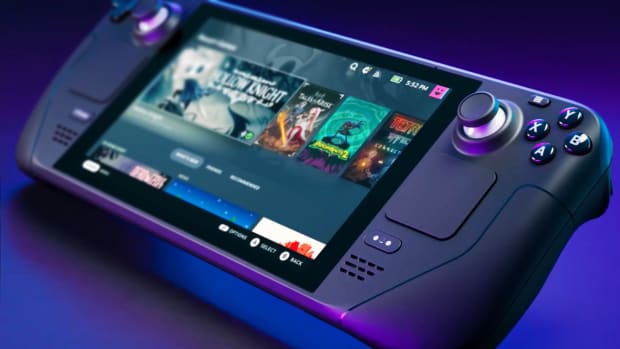If you've paid a shred of attention to the video game industry over the last few decades, you already know that three companies dominate it: Nintendo (NYDOY) , Sony (SNE), and Microsoft (MSFT).
While several other companies have tried to enter the space with varying degrees of success, such as Sega (remember the Sega Genesis, '80s kids?), none of them have managed the staying power of the big three.
Looking at the numbers, it's easy to see that any newcomer to the scene would have to innovate in a truly dynamic way to stand even the barest chance. With a sizeable portion of the $180 billion in revenue generated in the video game sector in 2021 belonging to these three companies, (Nintendo sold 103.54 million of the Nintendo Switch alone that year), one might say it's impossible to compete.
That is, until a player that entered the scene back in 1996 decided it was time to give the big names a run for their money.
What is The Steam Deck and Who Makes It?

Valve
That effort is a handheld video game console called the Steam Deck, and it's made by a company called Valve Corporation. Founded by former Microsoft employees Gabe Newell and Mike Harrington, the privately-owned business was valued at a none-too-shabby $10 billion as of 2019.
Valve published its own video games at first, but its first major market impact came in 2003 with the release of the digital distribution platform Steam. Specifically created to cater to computer gaming enthusiasts and packed with close to 10,000 games, Steam went on to become the most popular marketplace of its type, catering to 24.7 million users as of 2020.
As Steam continued to grow, Valve started feeling its way into the hardware space. The Steam Machine, launched in 2013, was its first try making a console, which it hoped could move its passionate PC and Mac gaming audience to playing their games on a television.
Unfortunately the idea didn't take off, but Valve was undaunted. Its next crack at hardware came in the form of VR. with the Valve Index, which launched in 2019. While the headset was the most expensive in the sub $10k market ($999 for the top of the line model), it also offered the highest quality VR experience available at the time. It remains the top competitor in that space, right behind Meta's (FB) Quest 2 (formerly known as the Oculus).
What Does the Steam Deck Do?
Valve's newest effort in the hardware space, the Steam Deck, is a computer you can hold in your hand. But it takes a cue from the Nintendo Switch in its shape and portability. However, its specs are light years more powerful than the Switch, and it allows PC and Mac gamers to take their entire game libraries on the go with ease.
One of the biggest issues with video game consoles like Nintendo, Xbox, and PlayStation is that their consoles have rarely been backwards compatible, meaning that when owners bought the newest iteration of a console, all the games owned on the previous one were stuck on it with no good way to retrieve them. This caused a lot of upset, as gamers did not want to have to plug in the old consoles to access the games they had paid for.
To respond to that concern, Nintendo, Sony, and Microsoft now all offer services that allow access to older games from their respective libraries. But none of the companies keep records of what customers bought and allow access to those games on new consoles.
Rather, the games either have to be purchased a second time to be played, or a membership is necessary to gain access to them (such as PlayStation Now and Nintendo Switch Online). This has been a longstanding source of frustration in the gaming community for many years.
The Steam Deck offers something that none of the gaming consoles on the market do: Access to any PC or Mac game purchased in any time period, as long as it's available on Steam. That means never having to buy a game twice or pay extra money to access it. And while the person that wants to play computer games on the go is a different type of consumer than one that's only played games on traditional consoles, the data shows the PC gaming is still a booming business.
The Steam Deck won't knock the other consoles off their thrones...yet. But with Valve's storied pedigree behind it and the strength of a few hardware experiments tucked in its pocket, its a formidable new player that the big three will need to watch out for.







